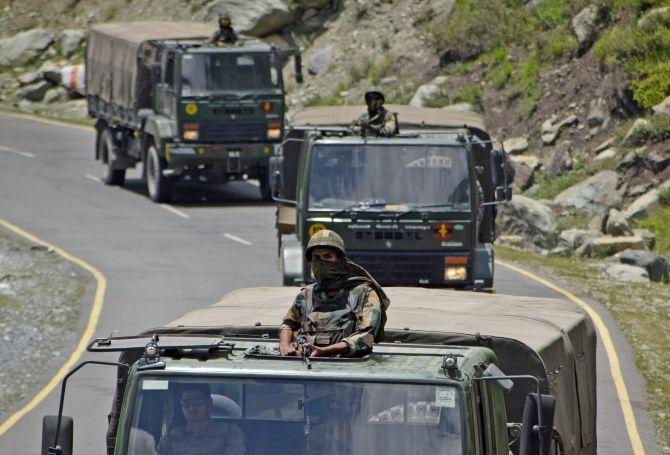Looking into the current situation on the China boarder, IOC has stocked up enough winter-grade fuel for the region. With army movements increasing, the demand for this fuel is expected to increase multifold from the 350 metric tonnes last winter.

With the coming winter likely to be one of the most tense for Indian soldiers in Ladakh, Indian Oil Corporation (IOC) has launched, only for the region, a special winter-grade diesel, to be used by the armed forces.
This fuel can withstand extremely low temperatures of around minus 33 degree Celsius.
“With army movements increasing, the demand for this fuel is expected to increase multifold from 350 metric tonnes last winter -- November, December, and January,” said a company source.
Upping the ante against Chinese aggression, Prime Minister Narendra Modi made a surprise visit at a forward position of Nimu in Ladakh on Friday, with Chief of Defence Staff General Bipin Rawat and Army Chief M M Naravane.
In a violent clash between soldiers of the two countries at Galwan on June 15, at least 20 Army persons died.
On Friday, Modi, addressing the soldiers, said: “The enemy has seen your fire and fury as well.”
The Indian Oil executive said looking into the current situation, the company had ensured and stoked up enough winter-grade fuel for the region.
“Last year, the demand from armed forces was less than this,” he added.
On November 19 last year, Home Minister Amit Shah had launched the special fuel for Ladakh, soon after its separation from Jammu and Kashmir on October 31. The launch of this fuel was part of the Rs 50,000 crore investment initiated in the region by the home minister then.
What is winter-grade diesel?
The fuel was specially designed for motorists in high-altitude sectors like Ladakh, Kargil, Kaza and Keylong.
In these regions, motorists face the problem of freezing of diesel during the winter season.
Normally, a major component of diesel is paraffin wax that improves viscosity and lubrication of the fuel.
However, according to temperature, it melts or thickens, affecting the normal performance of vehicles. IOC had launched this special fuel to tide over this issue, including additives to diesel helping it to remain in a fluid situation.
This fuel has a low pour-point of minus 33 degree Celsius, which does not lose its fluidity function even in extreme winter conditions.
To ensure cooking gas supply to the region, IOC runs a liquefied petroleum gas (LPG) bottling plant at Phey Village of Ladakh, which is 11,800 feet above the sea level.
The plant ensures cooking gas access to far-flung areas of Ladakh and Kargil, besides serving the Indian security forces. This plant, with a capacity of 8,000 metric tonnes (tmt) per month, came to the limelight as women make up for more than half of the total staff strength of 20, braving the temperature of minus 30 degrees.












 © 2025
© 2025